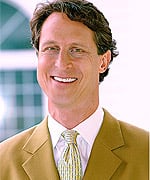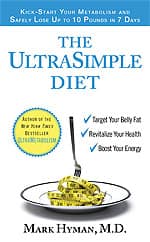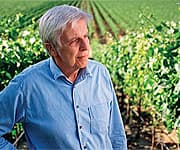Life Extension Magazine®
Mark Hyman, MD, is a doctor who just doesn’t fit the mold. Rather than simply treating the symptoms of disease, he acts as “medical detective” to uncover and address the underlying causes of illness. Dr. Hyman’s interest in alternative health care began long before he decided to go to medical school for conventional training. His unique approach to medicine grew out of his own serious illness. Dr. Hyman is the founder and medical director of the UltraWell-ness Center in Massachusetts, and formerly was the medical co-director of Canyon Ranch health resort in Lenox, Massachusetts. An innovative and futuristic thinker, Dr. Hyman envisions widespread changes to promote better health, longevity, and health care. Dr. Hyman is the author of two popular books on weight loss and health. His book Ultra-Metabolism (Scribner, 2006) was on The New York Times best seller list for 19 weeks and was selected as the number one health book of the year by Amazon.com. Recently, he published The UltraSimple Diet (Pocket Books, 2007). Principles of The UltraSimple DietWhile many will use this latest book for quick weight loss, Dr. Hyman’s detailed explanations of important health care issues can serve as the basis for radical change in both self-care and national health care. In The UltraSimple Diet, he discusses the following:
An Early Interest in Alternative Medicine“When I was fifteen,” says Hyman, “I went to visit my sister at college, and everybody was a vegetarian. I began to eat that way and I liked it. I was also exposed to different ways of thinking, and heard Robert Thurman speak about Tibetan healing, becoming aware of it even before I went to college.” Majoring in Asian studies at Cornell, Hyman was fascinated by the Eastern concept of the connection between healing the body and healing the mind. He began an independent study of nutrition, practiced yoga, and continued eating as a vegetarian. At that time, he also befriended a student who taught him about fiber and the gut—pioneering research at the time. “And then I got sidetracked and went to medical school,” he explains, “but I pretty much came back to those views after realizing that the tools I learned weren’t helping people get better, and that sometimes they didn’t even work at all.” Functional MedicineEventually, Dr. Hyman’s interest in nutrition led him to functional medicine. He describes this discipline as, “a way of thinking about problems that focuses on the roots of disease, understanding the environmental influences—such as diet, lifestyle, and toxins—that affect us, and how those influence our genes, and in turn, our physiology.” As toxins interact with our genes, most of us become imbalanced in the core systems of our bodies. Dr. Hyman stresses that such an imbalance lies at the root of all illness. “Disease arises from imbalances in three core systems. Healing has to come from the root, not from the outside symptoms,” says Dr. Hyman. “Functional medicine helps us navigate this new paradigm, understanding the patterns, relationships and connections between different things.”
So, for example, a patient might have arthritis, a rash, a stomachache, and irritable bowel syndrome. To address these problems, conventional medicine would send him to a rheumatologist, a gastroenterologist, and a dermatologist. But, says Dr. Hyman, “Those aren’t separate problems; they may all be related. My job is to figure out how they’re connected and how to solve them by helping the patient deal with the causes and get their body back into balance. I’m basically a medical detective,” concludes Hyman. “That’s essentially what I do.” Getting The Word OutHyman sees his ultimate mission as educating the public and the medical profession. “My goal is to give people a chance to access the best kept secret in our society right now—that functional medicine can really transform health by dealing with the causes of disease, rather than just the symptoms.” “This is the biggest secret since the invention of the light bulb,” he adds, “and I think it has the potential to impact our world, our culture, and our health as much as the internet. It’s one of the few great ideas to emerge in a generation.” By incorporating this new paradigm, Dr. Hyman envisions that chronically ill Americans—who comprise nearly half the population—can become vibrantly healthy. “We have the tools, the knowledge, the science, and the information,” he says, “but it’s not being explained or understood or practiced, and I want to accelerate that process.”
Hyman frequently lectures, gives workshops, writes, and makes appearances on shows including Today, The View, Good Morning America, The Early Show, and networks such as CNN, FOX, PBS, and NPR. He is also collaborating with Harvard researchers on projects involving functional medicine, systems thinking, and systems medicine, and meeting with government officials to discuss the profound paradigm change happening around prevention, chronic care, and functional medicine. Hyman notes that what he really cares about is “giving people the experience of what it’s like to feel good, and helping them understand the connection between the choices they make and how they feel.” After that, he says, they can do what they want, but at least, for the week that they follow his UltraSimple diet, they will experience, “a different physiology, and they will see how quickly it can happen and how profoundly much better they can feel. They can then see how chronic symptoms that they thought they had to live with forever were really just a reflection of imbalances they could quickly correct.” Aging and LongevityHyman says that in our society, what we regard as aging is actually abnormal, not normal. “The conditions that we see, such as cancer, heart disease, stroke, or diabetes, and even just the general decline with age, are results of altered physiology and imbalances in various systems of the body that promote more rapid aging.” Dr. Hyman identifies a whole series of what he calls “pre-disease states.” Toxicity and inflammation are two of the key ones, but most people—and most physicians—don’t recognize them until a disease is diagnosed. “For example,” Dr. Hyman explains, “with cancer, or solid tumors, they tell us you don’t have cancer until you walk into your doctor’s office, the doctor says you have a tumor, and a biopsy confirms that you have cancer. Well, guess what? Those solid tumors have been growing for 30 years in your body.” “If you have heart disease or suffer a heart attack, guess what? That plaque has sometimes been going on for 30, 40, or even 50 years. These are abnormal physiological processes that we can identify, understand, and treat before they develop into the disease state.” Aging is also promoted by mitochondrial dysfunction, hormonal imbalances, digestive problems, insulin resistance, and nutritional deficiencies—all of which promote rapid aging. “I think when you look at our life span,” Dr. Hyman observes, “our life expectancy is related to our current age of death, which is in the 70s. But if you say what our life span is as an organism, it’s potentially 120 years or more.”
“So I think if we can understand, measure, evaluate, and correct these imbalances, we will see a gradual and significant increase in life span and life expectancy. The one thing that would have the biggest impact is correcting insulin resistance, because that’s what triggers inflammation and toxicity in the body and contributes to cancer, heart disease, dementia, diabetes, and strokes. All the common things people die from are related to insulin resistance, so it’s critical to correct it.” What advice does Dr. Hyman have for those of us who want to live longer right now? “In order to increase your longevity,” he says, “you have to find out why we age. And then you have to address those causes of aging.” Dr. Hyman addresses these topics in all of his books. “You have to figure out what your own unique genetics are. For example, you have to figure out if you’re more susceptible to insulin resistance than the next person. If so, you might need to be really careful, and you might need different supplements. You might need to personalize your health care, depending on your own unique biochemical needs and genetic requirements, and really work on learning what your own body needs to thrive.” Dr. Hyman’s office gives patients a 20-page medical questionnaire at their first visit, so that the staff can learn as much as possible about their medical and family histories, diets, exposures, and how they think and feel. He adds that about 95% of his patients come from out of town, since it is often difficult to find a functional medicine physician who works the way he does. The Doctor’s Personal RegimenAbout twelve years ago, Dr. Hyman was seriously ill with chronic fatigue syndrome. He discovered that he had mercury toxicity, hormonal imbalance, exhaustion from stress and overwork, and many other health problems. He began to “learn from the inside out how each of those systems works and how to correct them.” The result was a total change in the way he lives and takes care of himself. Dr. Hyman always has a healthy breakfast with omega-3 enriched eggs or some other type of protein such as a protein shake, along with fruit and flaxseeds; lunch with a variety of vegetables; dinner with fish, chicken, or beans, and lots of vegetables, salads, and fruit. He estimates that up to 90% of what he eats is organic. His beverages include frequent green tea and occasional black tea or coffee. Hyman is a strong believer in supplements. He takes a multi-vitamin, fish oil, amino acids, vitamin D, coenzyme Q10, L-carnitine, and sometimes other supplements, depending on how he feels. “I take a number of things that I think are critical in terms of my own health,” he explains, mentioning that he has some genetic problems with glutathione metabolism, and the amino acids he takes facilitate detoxification. Still a yoga advocate, Dr. Hyman recently returned from a week-long yoga retreat in Mexico. The retreat included a detox diet, five hours of exercise on the beach each day, and ten hours of sleep each night. “After I came back from that week,” he says, “I felt better than I’ve felt for ten years.” He also follows his own advice, indulging in a nightly UltraBath of very hot water with a mixture of Epsom salts, baking soda, and lavender oil. This is key component of his program. Dr. Hyman says this bath relaxes the nervous system; lowers cortisol and inflammation, promotes weight loss, detoxification, and healing; enhances sleep; increases circulation and heart rate; and lowers blood pressure and blood sugar levels. A Wake-Up CallTo sum up, Hyman says that “people don’t necessarily know the harm they are doing to themselves, they aren’t aware of the connection between the choices they make and how they feel. They don’t realize that what they are feeding themselves is creating the diseases that they have. And I think that even though there’s a big disconnect, there’s also a great opportunity for people to wake up.” Through his books, lectures, and dedication to promoting health, Dr. Mark Hyman hopes to help people wake up to the possibility of living long, vibrantly healthy lives. For more information visit www.drhyman.com. |




